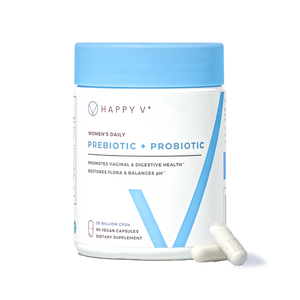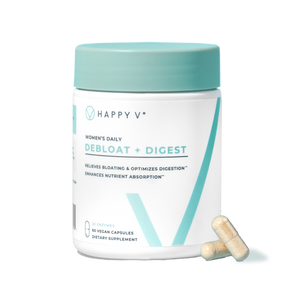- Fact Checked
- November 01, 2025
- 11 min read
How to Lose Weight with PCOS: 6 Strategies
Table of Contents
Table of Contents
When you're living with PCOS, it can feel like your body is constantly working against you, especially when it comes to weight loss. You can be eating clean and exercising regularly, and still see little change on the scale. The truth is, weight issues with PCOS aren't about lack of willpower; they're about complex hormonal and metabolic shifts that require a different approach. With the right strategies, support, and science-backed tools, you can regain balance, improve your symptoms, and feel confident in your own skin.
This post is for informational purposes only and does not constitute medical advice. See full disclaimer below.
Understanding the PCOS-Weight Connection
Polycystic Ovary Syndrome (PCOS), also known as polycystic ovarian syndrome, affects about 1 in 10 women of reproductive age, making it one of the most common hormonal conditions1. Despite how common it is, though, it's often misunderstood. For example, not everyone with PCOS has ovarian cysts. What they do have, though, is a hormonal imbalance that can disrupt regular menstrual cycles and cause irregular periods, increase levels of androgens (aka male hormones), and alter how the body processes insulin and stores fat.
Insulin resistance is one of the main reasons that people with PCOS struggle to lose weight and may experience weight gain or obesity2. When you have insulin resistance, your cells don't respond properly to insulin, or the hormone that helps your body use glucose for energy. To compensate, your pancreas produces even more insulin. Those elevated blood sugar levels and insulin levels not only promote fat storage (especially around the abdomen) but also trigger more androgen production, which can further disrupt hormones and metabolism.
If you're thinking, "That sounds like a vicious cycle," that's because it kind of is. Excess weight can worsen symptoms of PCOS, while the condition itself makes achieving a healthy weight more difficult. It can also increase the risk of developing type 2 diabetes and heart disease. Fortunately, there are proven strategies that can help break this cycle and help move the needle on your weight loss goals.
Dietary Strategies for Losing Weight with PCOS
A balanced diet being key to weight loss isn't exactly a revolutionary insight, but when you're living with PCOS, there are particular eating habits and dietary approaches to pay attention to, namely:
Consider Keto
Carbohydrates aren't the enemy, but how and which carbs you eat matter a lot when it comes to PCOS and managing blood sugar levels3. Consider adopting a low-glycemic diet, which swaps refined carbs like white bread and pastries for complex carbs like quinoa, brown rice, and sweet potatoes that don't spike your blood sugar dramatically.
Some women with PCOS also find success losing weight with a ketogenic diet, which dramatically reduces carbs and trains the body to burn fat for fuel4. The key is finding the best diet that makes your body feel its best.
Combine Protein and Fiber
Protein and fiber are essentially the dynamic duo. They help you feel fuller longer, stabilize blood sugar, and support healthy metabolism and body weight management. A high-protein diet can be particularly beneficial for PCOS. Protein helps preserve muscle mass during weight loss, boosts metabolism, and keeps hunger at bay5. Make sure each meal is centered around quality lean proteins like eggs, Greek yogurt, lean meats, fish, legumes, and tofu.
A high-fiber diet does wonders for blood sugar regulation and gut health. Load up on vegetables, fruits (especially berries), beans, lentils, and whole grains. Fiber also feeds your healthy gut bacteria, which increasingly appear to play a role in hormone balance and metabolism.
Embracing Healthy Fats (Yes, Really!)
For years, we were told fat makes you fat and that a low-fat diet was ideal, but that is just not true. Healthy fats are essential for hormone production and can actually support weight loss by keeping you satisfied and reducing inflammation.
Focus on fat sources like avocados, olive oil, nuts, seeds, and fatty fish rich in omega-3s. These fats support heart health (important since PCOS increases cardiovascular risk and cholesterol levels) and may help improve insulin sensitivity.
Eat More Whole Foods
Anyone living with a chronic condition (or anyone living, period) would benefit from minimizing processed foods. Which, sure, is easier said than done in our modern food environment. But these foods are often packed with hidden sugars, unhealthy fats, and ingredients that can worsen insulin resistance and inflammation.
Instead, embrace whole foods, or foods you could theoretically pick, catch, or harvest yourself. When you build your diet around vegetables, fruits, whole grains, quality proteins, and healthy fats, your body gets the nutrients it needs to heal and thrive.
Try Tried-and-True Eating Patterns
Like keto, two other dietary patterns consistently show benefits for PCOS are the Mediterranean diet and the DASH diet.
The Mediterranean approach emphasizes vegetables, fruits, whole grains, legumes, olive oil, fish, and modest amounts of poultry and dairy. It's naturally anti-inflammatory and also naturally delicious, full of colorful salads drizzled with olive oil, grilled fish with herbs, and plenty of fresh vegetables6.
The DASH diet (aka Dietary Approaches to Stop Hypertension) is similar but was originally designed for heart health and managing blood pressure. Both patterns naturally reduce processed foods and added sugars while providing plenty of the nutrients your body craves7.
Consider working with a nutritionist, dietitian, or healthcare provider who specializes in PCOS to create a personalized plan. What works wonders for one person might not click for another, and that's okay!
Targeted Supplements for Weight Loss with PCOS
And no, we aren't talking about weight loss pills or injections!
While diet is the foundation of any PCOS weight loss plan, the right supplements can provide additional support by addressing the hormonal imbalances at the root of PCOS symptoms. Since PCOS is fundamentally a hormonal disorder, supplements that help balance hormone levels can be game-changers for managing symptoms and supporting weight loss efforts.
Look for supplements that contain clinically proven ingredients like:
- Myo-Inositol (MI): Supports more regular menstrual cycles, promotes healthy ovulation, and helps maintain balanced insulin levels8.
- D-Chiro-Inositol (DCI): Works alongside Myo-Inositol to support ovarian health, improve insulin sensitivity, and encourage menstrual regularity9.
- Diindolylmethane (DIM): Supports healthy estrogen metabolism and helps maintain ovarian and hormonal balance10.
- Selenium: Provides antioxidant support for ovarian cells and helps maintain egg count and quality in women experiencing oxidative stress11.
- BroccoRaphanin® (Broccoli Seed Extract): A powerful antioxidant that reduces oxidative stress in ovarian cells and supports overall reproductive and metabolic health12.
- Zinc Citrate: Helps maintain healthy hormone activity and supports normal metabolism linked to cycle balance13.
- Berberine: A plant-based compound that helps improve insulin sensitivity and reduce inflammation14.
- Chromium: Supports glucose metabolism and insulin function for better blood-sugar control15.
- Vitamin D: Often low in women with PCOS; supports insulin sensitivity, menstrual regularity, and overall metabolic health16.
Happy V Ovarian Support combines all of these evidence-backed ingredients into one comprehensive formula, designed to promote hormonal balance, improve insulin sensitivity, and help your body work with you—not against you—on your weight-loss journey.
Some healthcare providers may also prescribe metformin, a medication commonly used to improve insulin sensitivity in women with PCOS. Discuss with your doctor whether metformin or other medical interventions might be right for you.
Exercise for Women with PCOS
Again, exercise and weight loss isn't exactly a novel concept, but regular physical activity is one of the most powerful tools for managing PCOS because it improves insulin sensitivity, helps balance hormones, and reshapes body composition by building muscle and reducing fat.
Moderate exercise like brisk walking, cycling, swimming, or dancing for 30–60 minutes most days can make a significant difference.
Strength training is especially beneficial. Think of it like installing solar panels on your metabolism. Muscle tissue burns more calories even at rest and helps your body use glucose more efficiently, which can ease insulin resistance. Aim for two to three strength training sessions a week that work all your major muscle groups.
Some women find that higher-intensity workouts or vigorous aerobic exercise further improve cardiovascular fitness and metabolic health. As with anything, though, balance is key. Overdoing intense exercise can sometimes raise stress hormones, which may work against your goals.
Above all, when it comes to exercise, the most important thing is finding movement you actually enjoy. Over time, many women with PCOS find that consistent movement becomes one of the most empowering forms of medicine.
Other Lifestyle Changes for Losing Weight with PCOS
Weight loss with PCOS isn't just about what you eat or how you move. It's also shaped by how you sleep, manage stress, care for your gut, and support your mental well-being. These daily habits can make or break your progress, so think of them as part of your treatment plan, not an afterthought.
Managing Stress and Emotional Eating
Chronic stress is one of the biggest hidden barriers to weight management17. Excess cortisol can increase belly fat, worsen insulin resistance, and heighten cravings for sugary comfort foods. Daily practices like journaling, meditation, deep breathing, mindfulness, or simply spending a few quiet minutes outside help lower cortisol levels and calm your nervous system, helping your body heal.
Emotional eating is common among women with PCOS—and it's completely understandable! The first step to breaking the cycle is awareness: pause before reaching for food and ask yourself what you're really feeling, whether that's stress, fatigue, boredom, or frustration.
Once you can identify the emotion, you can choose a different response, such as taking a short walk, calling a friend, or practicing slow, intentional breathing.
Getting Quality Sleep
Poor sleep can undo even the best diet and exercise routine, especially when you have PCOS18. Inadequate rest disrupts the hormones that regulate hunger and fullness, making you hungrier and less satisfied.
Prioritizing good sleep hygiene (think: consistent bedtimes, cool dark rooms, and limiting screens before bed) can dramatically improve energy, metabolism, and weight management. If you're sleeping seven to nine hours but still wake up exhausted, it's worth talking with your doctor. Many women with PCOS also struggle with sleep apnea and other sleep disturbances.
Supporting Gut Health
While "ovaries" may be in the name, PCOS is heavily influenced by your gut bacteria. A healthy gut microbiome influences inflammation, insulin sensitivity, and even hormone regulation.
Focus on eating plenty of probiotic-rich foods like yogurt, kefir, sauerkraut, and kimchi in combination with plenty of fiber from vegetables, legumes, and whole grains. Together, they create an internal environment that supports better digestion, balanced hormones, and metabolic health.
Getting the Right Support
You don't have to figure this out alone. Working with a nutritionist, dietitian, or healthcare professional who specializes in PCOS, women's health, endocrinology, or gynecology can make a world of difference. These experts don't just take your calories and macros into account, but will also consider your relationship with food, stress levels, BMI, and environment to craft a weight loss plan that works with and for you.
Apps and digital tools can also be helpful for tracking meals, activity, and symptoms, but they're definitely optional. Use them if they empower you, not if they add pressure.
Building Sustainable Habits
Here's the truth: crash diets and "quick fixes" don't work for PCOS. The ultimate goal is a lifestyle that supports your hormones and long-term health. Shift your mindset from "I'm on a diet" to "I'm nourishing my body."
Celebrate non-scale victories like steadier energy, clearer skin, regular cycles, better sleep, improved mood, and more strength. These are signs your body is healing, even before the scale moves and you reach your healthy weight.
Consistency, not perfection, is what matters most. Some days you'll miss a workout or eat dessert, and that's okay. Progress happens through patterns, not perfection.
Final Thoughts
Losing weight with PCOS is not impossible. It takes time, patience, and the right tools. Balanced nutrition, consistent movement, targeted supplements, and stress management all add up to real, lasting progress.
Remember, healing isn't about perfection, but about consistency and self-compassion. Every healthy choice you make supports your hormones, metabolism, and confidence. And because PCOS can increase the risk of other health concerns like infertility, endocrine issues, and cardiovascular problems, taking care of your body weight and overall health now can have lasting benefits for years to come.
Keep the Conversation Going
- Visit our blog for more on BV treatment options and women's health tips.
- Join our private Happy V Facebook group to hear from others who've been there.
- Explore supplements designed to support your vaginal health journey.
Disclaimer: This blog is for informational and educational purposes only and is not intended to diagnose, treat, cure, or prevent any disease. Statements about supplements have not been evaluated by the Food and Drug Administration. For more information about vaginal infections, visit the CDC or speak to a licensed healthcare provider.














